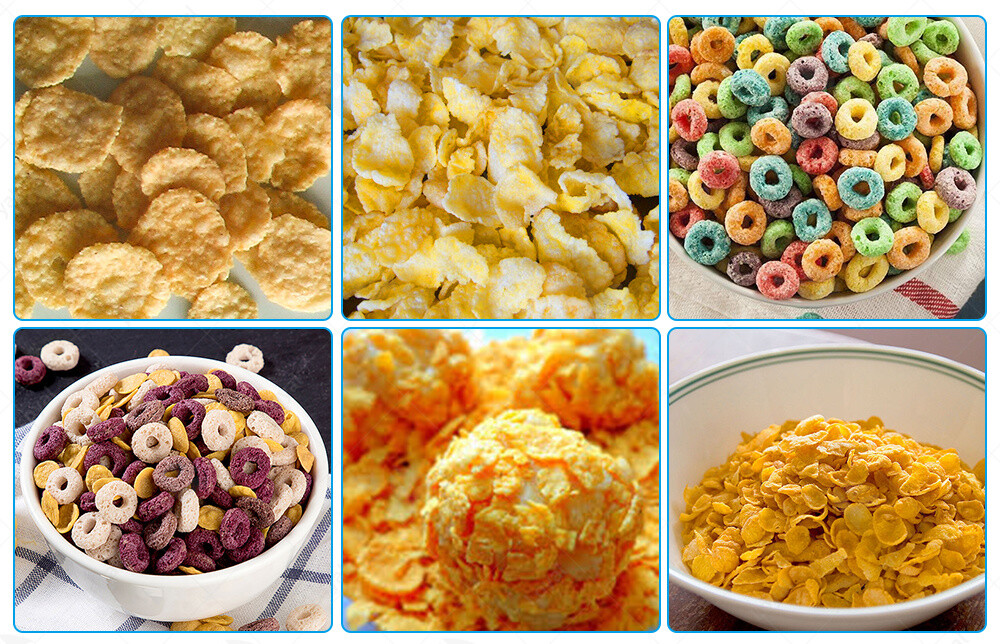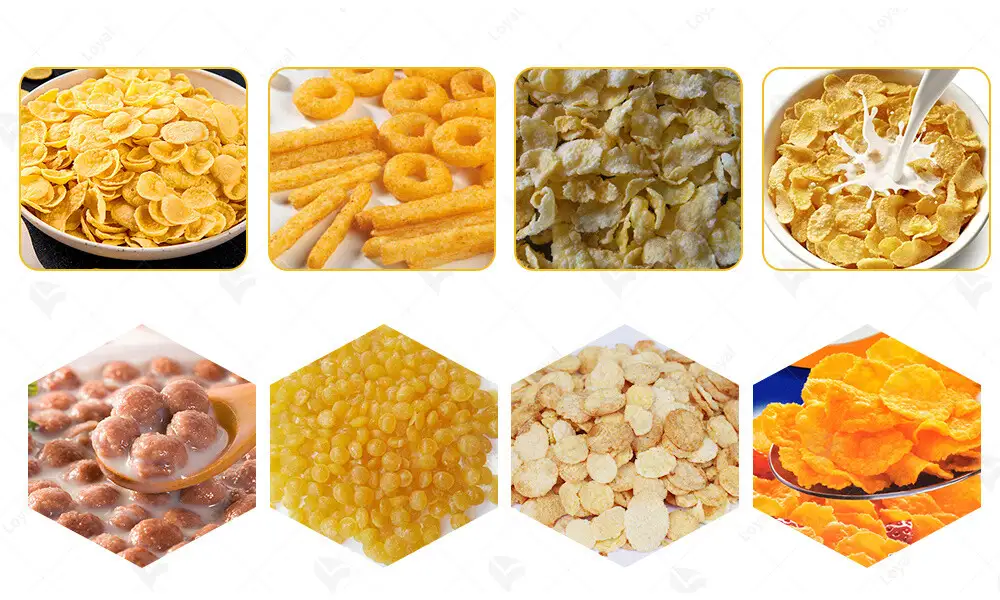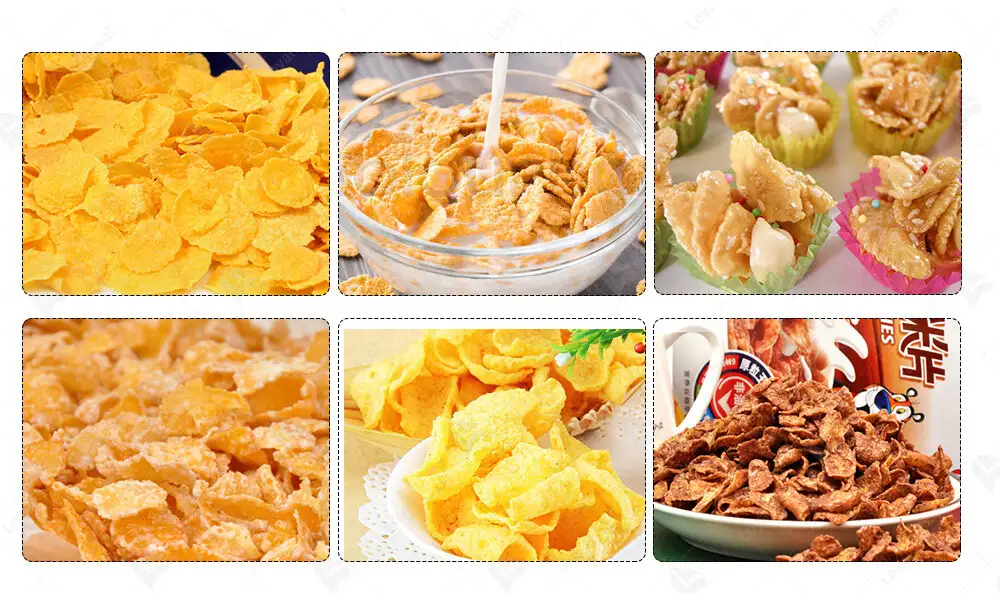Everything you need to know about corn flakes production line In 2024
Corn Flakes Production Line Introduction
In the bustling landscape of industrial food machinery, the corn flakes production line stands as a pinnacle of innovation and efficiency. Engineered to transform raw corn grains into the beloved breakfast staple, this marvel of engineering combines precision, speed, and reliability to meet the ever-growing demands of consumers worldwide.
At its core, the corn flakes production line is a symphony of specialized machinery meticulously orchestrated to achieve optimal results. It begins with the cleaning and conditioning of the raw corn, where impurities are removed, and moisture levels are carefully regulated to ensure consistency in the final product. This initial stage sets the foundation for the entire process, emphasizing the importance of quality control and attention to detail.
Throughout the production line, automation plays a vital role in streamlining operations and maximizing efficiency. Advanced control systems monitor key parameters in real-time, allowing for immediate adjustments to maintain consistency and minimize waste. From ingredient dosing to packaging, every aspect of the process is meticulously optimized to deliver superior results with minimal human intervention.
In addition to efficiency, sustainability is a growing focus within the industry, with manufacturers implementing innovative solutions to reduce energy consumption and waste generation. From recycling water used in processing to utilizing renewable energy sources, efforts are underway to minimize the environmental footprint of corn flakes production lines without compromising performance or quality.

Components of a Modern Corn Flakes Production Line
In the dynamic landscape of industrial food processing machinery, the corn flakes production line stands out as a pinnacle of efficiency and precision engineering. As we delve into the components comprising a modern corn flakes production line in 2024, it's imperative to grasp the intricate interplay between technology, innovation, and quality assurance in this domain.
1. Raw Material Handling and Preparation:
At the heart of any corn flakes production line lies the meticulous handling and preparation of raw materials, chiefly corn. The process begins with the intake of maize grains, which undergo thorough cleaning to eliminate impurities and foreign particles. Subsequently, the cleaned corn is conditioned to attain optimal moisture content, ensuring uniformity in texture and taste. Advanced conveying systems facilitate the seamless transportation of conditioned corn to subsequent processing stages, laying the foundation for consistency in end-product quality.
2. Extrusion and Cooking:
Extrusion serves as a cornerstone in modern corn flakes production, wherein the conditioned corn is subjected to high temperature and pressure within specialized extruders. This process imparts the characteristic texture and shape to the corn flakes while enhancing their digestibility and nutritional profile. Advanced extrusion technologies, equipped with precise temperature and pressure controls, enable manufacturers to achieve unparalleled uniformity in product attributes, setting the benchmark for consumer satisfaction.
3. Drying and Toasting:
Following extrusion, the formed corn flakes undergo thorough drying to reduce moisture content to optimal levels, thereby prolonging shelf life and preserving freshness. State-of-the-art drying systems leverage cutting-edge techniques such as hot air convection and infrared radiation to expedite the drying process while maintaining product integrity. Subsequent to drying, the corn flakes are meticulously toasted to impart the desired flavor profile, culminating in a product that epitomizes sensory delight and nutritional excellence.
4. Coating and Flavoring:
Incorporating an array of coatings and flavorings is instrumental in enhancing the sensory appeal and consumer acceptance of corn flakes. Modern production lines integrate automated coating and flavoring systems, allowing for precise application of coatings such as sugar or honey and flavorings ranging from vanilla to cocoa. These systems are adept at modulating coating thickness and flavor intensity, catering to diverse consumer preferences and market trends with unparalleled versatility.
5. Packaging and Quality Control:
The final stages of a corn flakes production line encompass packaging and quality control, where paramount importance is accorded to product safety, integrity, and traceability. Advanced packaging machinery, equipped with automated weighing, filling, and sealing capabilities, ensures efficient packaging operations while minimizing product wastage. Concurrently, rigorous quality control protocols are enforced throughout the production process, encompassing stringent inspections for texture, flavor, and nutritional content, thereby upholding the highest standards of product excellence and regulatory compliance.

Technological Advances in Corn Flakes Production Lines
In the ever-evolving landscape of industrial food machinery, corn flakes production lines have witnessed significant technological advancements in 2024. These innovations are reshaping the efficiency, output quality, and sustainability of corn flakes manufacturing processes. Here, we delve into three key technological advances driving this transformation.
1. Automated Ingredient Mixing Systems
Traditionally, corn flakes production involved manual or semi-automated mixing of ingredients such as cornmeal, sugar, salt, and flavorings. However, in 2024, manufacturers are embracing fully automated ingredient mixing systems. These systems utilize precision-controlled dispensers and mixers to ensure uniform blending of ingredients in predetermined ratios. By minimizing human intervention and optimizing ingredient distribution, corn flakes production line achieve higher consistency in taste, texture, and nutritional content.
2. Continuous Cooking and Extrusion Processes
Another groundbreaking advancement in corn flakes production line is the adoption of continuous cooking and extrusion processes. Unlike traditional batch cooking methods, which are time-consuming and prone to variations, continuous cooking systems enable uninterrupted processing of cornmeal mixtures. Advanced extruders exert precise pressure, temperature, and shear forces to cook the mixture rapidly while maintaining desired texture and flavor. This continuous production flow enhances efficiency, reduces energy consumption, and ensures consistent product quality.
3. Integrated Packaging and Quality Control Systems
In 2024, corn flakes production line are integrating packaging and quality control systems seamlessly. Automated packaging machines equipped with sensors and actuators monitor various parameters such as fill weight, seal integrity, and package integrity in real time. Any deviations from predefined quality standards trigger immediate adjustments or halts in production, minimizing waste and ensuring product safety. Additionally, advanced labeling and tracking technologies enable traceability throughout the supply chain, enhancing transparency and compliance with regulatory requirements.
These technological advances represent just a glimpse of the continuous innovation driving the corn flakes production line industry forward in 2024. As manufacturers strive to meet consumer demands for healthier, tastier, and more sustainable food products, we can expect further advancements in automation, process optimization, and quality assurance. Stay tuned as the future of corn flakes production unfolds at the intersection of engineering excellence and culinary innovation.

Operational Considerations and Best Practices for Corn Flakes Production Line
In 2024, the corn flakes production line stands at the forefront of industrial food processing, integrating cutting-edge technologies and operational strategies to meet the increasing demands of consumers worldwide. As experts in the field of industrial food machinery, we delve into the operational considerations and best practices essential for optimizing the efficiency and quality of corn flakes production.
1. Automated Production Processes
In the contemporary landscape of food manufacturing, automation reigns supreme. Corn flakes production lines have evolved to incorporate advanced automation technologies, streamlining the manufacturing process from raw material handling to packaging. Automated systems ensure precision in ingredient measurement, mixing, cooking, and shaping, minimizing human error and enhancing consistency in product quality. By investing in state-of-the-art automation solutions, manufacturers can significantly boost production capacity while reducing labor costs and enhancing overall efficiency.
2. Quality Control and Assurance
Maintaining stringent quality control measures is paramount in the production of corn flakes to uphold consumer satisfaction and brand reputation. Implementing comprehensive quality assurance protocols throughout the production line is imperative, encompassing thorough inspection of raw materials, monitoring of processing parameters, and rigorous testing of final products. Advanced sensor technologies and data analytics enable real-time monitoring of critical variables such as moisture content, temperature, and texture, facilitating prompt adjustments to optimize product quality and consistency.
3. Sanitary Design and Hygienic Practices
In adherence to food safety regulations and industry standards, corn flakes production lines must prioritize sanitary design principles and adopt rigorous hygienic practices. Equipment and machinery should be constructed using food-grade materials resistant to corrosion and contamination, facilitating easy cleaning and sterilization procedures. Regular sanitation protocols, including equipment disassembly, cleaning, and sanitization, are essential to prevent microbial growth and ensure product safety. Additionally, personnel involved in production should undergo comprehensive training on hygiene practices and wear appropriate protective gear to minimize the risk of contamination.
4. Maintenance and Equipment Upkeep
Maximizing the uptime and longevity of corn flakes production lines necessitates proactive maintenance strategies and diligent equipment upkeep. Scheduled maintenance routines should be established to inspect and address potential issues before they escalate into costly downtime events. Routine lubrication, calibration, and replacement of worn components are essential to preserve equipment performance and prevent mechanical failures. Furthermore, investing in predictive maintenance technologies, such as vibration analysis and thermal imaging, enables early detection of equipment anomalies, facilitating timely interventions and minimizing production disruptions.
5. Sustainable Practices and Resource Efficiency
In alignment with global sustainability initiatives, corn flakes production lines are increasingly adopting eco-friendly practices to minimize environmental impact and conserve resources. Implementing energy-efficient technologies and optimizing process parameters reduce energy consumption and carbon emissions, contributing to a greener manufacturing ecosystem. Additionally, waste reduction strategies, such as byproduct valorization and recycling, mitigate waste generation and promote circular economy principles. By embracing sustainable practices, manufacturers can enhance operational efficiency while fulfilling their corporate social responsibility commitments.

Environmental Sustainability of Corn Flakes Production
As experts in the realm of industrial food machinery, we understand the paramount importance of ensuring that production processes align with environmental sustainability standards. In 2024, as the demand for corn flakes continues to soar, it becomes imperative to delve into the environmental footprint of corn flakes production lines.
Corn flakes production line operations, while efficient in meeting consumer demands, can pose significant environmental challenges if not managed thoughtfully. One of the primary concerns is the energy consumption associated with various stages of production, from grain processing to packaging. To mitigate this, manufacturers are increasingly turning to renewable energy sources such as solar and wind power to fuel their operations. By integrating energy-efficient technologies into the production line, such as advanced heating and cooling systems and optimized machinery, companies can significantly reduce their carbon emissions and overall environmental impact.
Another critical aspect of environmental sustainability in corn flakes production is water usage. The process of turning maize into flakes requires a considerable amount of water for cleaning, soaking, and cooking the grains. To address this concern, manufacturers are implementing water recycling and purification systems to minimize consumption and ensure responsible water management practices. Additionally, innovations in processing techniques are being explored to reduce water usage without compromising product quality, thus furthering the industry's commitment to sustainability.
Furthermore, waste management is a crucial consideration in the quest for environmental sustainability. Corn flakes production generates various types of waste, including food waste, packaging materials, and by-products from processing. To tackle this issue, manufacturers are adopting comprehensive waste reduction and recycling strategies. For instance, by repurposing food waste as animal feed or compost and implementing reusable or biodegradable packaging materials, companies can minimize landfill contributions and promote a circular economy model.
In line with the principles of environmental stewardship, many corn flakes production facilities are also prioritizing eco-friendly practices in their supply chain management. This includes sourcing raw materials from sustainable agricultural practices that minimize pesticide use, soil degradation, and water pollution. Collaborating with local farmers who employ regenerative farming techniques not only ensures a consistent supply of high-quality maize but also contributes to the preservation of biodiversity and ecosystem health.

Regulatory Compliance and Food Safety Standards
In the dynamic landscape of food production, adherence to regulatory standards and food safety protocols is paramount, especially within the realm of corn flakes production line operations. As experts in industrial food machinery, we recognize the critical importance of maintaining compliance with regulatory bodies and upholding rigorous food safety standards to ensure the integrity of the production process and the safety of the final product.
Regulatory Compliance:
The corn flakes production line must align with a myriad of regulatory requirements set forth by governing bodies such as the Food and Drug Administration (FDA) in the United States, the European Food Safety Authority (EFSA) in Europe, and equivalent organizations worldwide. These regulations encompass various aspects of production, including equipment design, material usage, sanitation procedures, and labeling requirements.
Ensuring compliance with these regulations necessitates meticulous attention to detail at every stage of the production line. From the sourcing of raw materials to the packaging of the final product, every aspect must be scrutinized to meet the stringent criteria outlined by regulatory authorities. Failure to comply with these regulations can result in severe consequences, including product recalls, fines, and damage to brand reputation.
Food Safety Standards:
In addition to regulatory compliance, adhering to food safety standards is essential to safeguarding consumer health and maintaining trust in the product. The corn flakes production line must implement robust food safety management systems, such as Hazard Analysis and Critical Control Points (HACCP), to identify and mitigate potential hazards throughout the production process.
Key components of food safety standards include:
1. Hygiene Practices: Strict hygiene protocols must be enforced within the production facility to prevent contamination. This includes regular cleaning and sanitization of equipment, facilities, and personnel.
2. Quality Control: Continuous monitoring of raw materials, production processes, and finished products is essential to ensure consistency and quality. Any deviations from established parameters must be promptly addressed to prevent compromised product integrity.
3. Allergen Management: As allergen awareness continues to rise, effective allergen management is crucial in corn flakes production. Segregation of allergenic ingredients, thorough cleaning procedures, and accurate labeling are imperative to prevent cross-contamination and protect consumers with food allergies.
4. Traceability: Traceability measures enable swift identification and recall of products in the event of safety concerns or quality issues. Implementing robust traceability systems allows for the precise tracking of ingredients from their source to the finished product, facilitating accountability and transparency in the supply chain.

Reference
1. Food Processing:
- Website: [Food Processing](https://www.foodprocessing.com/)
2. Food Engineering:
- Website: [Food Engineering](https://www.foodengineeringmag.com/)
3. Process Industry Forum:
- Website: [Process Industry Forum](https://www.processindustryforum.com/)
4. Food Manufacture:
- Website: [Food Manufacture](https://www.foodmanufacture.co.uk/)













